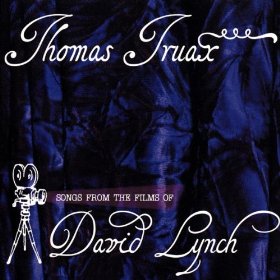They could almost have been separated at birth. They even dress similarly: apparently when they met, the first thing Lynch said was to compliment Truax’s shoes. But both men seem to inhabit a similar sort of world, one at a slight remove from our own. David Lynch — dubbed “Jimmy Stewart from Mars” by Mel Brooks — a director synonymous with the weird, uncanny, small town America; and Thomas Truax, a one-man band who claims to be from a place called Wowtown and wrote his first album — performed with a number of self-invented instruments with fantastical names ("The Hornicator", "Sister Spinster") — all about the strange folk who lived there. Not only in spirit, but also musically there was already common ground. Truax’s music has always been heavily influenced by the same good, old-fashioned rock ‘n’ roll that soundtracked some of Lynch’s films. But his was just as skewed and eccentric a take on the sound of the fifties as Lynch’s films were of that decade’s look, as though spied through the same distorted funhouse mirror.
So in a sense, perhaps this tribute album (of sorts) was inevitable. Truax had no choice but to follow through an inner logic already predetermined by the situation — a predicament he has evidently found liberating. For Songs from the films of David Lynch is both Truax’s most conventional album and his most experimental. From the relatively straight two-beat rockabilly of ‘Baby Please Don’t Go’ and the almost perversely faithful — if somewhat more lo-fi — version of ‘Audrey’s Dance’ from Twin Peaks, to the dreamlike cloud sculpture from which Eraserhead‘s ‘Lady in the Radiator Song’ emerges, the record seems playful in its stylistic restlessness. Nor is this album of cover versions without its innovations and surprises. Julee Cruise’s haunting ballad from Twin Peaks, ‘Falling’, is re-animated as a jaunty bubblegum bopper in the manner of the Easy Beats or Danny and the Juniors, and Beck’s ‘Black Tambourine’ provides an opportunity for a virtuoso hornicator work-out.
If the greatest departure is perhaps also the album’s greatest mistake — the plucked acoustic arpeggios make a poor subsitute for Brian Eno’s neon production of ‘I’m Deranged’, serving only to highlight the relative weakness of the song beneaty the studio gloss – too great fidelity is not without its attendant risks. The opening track, a cover of ‘Wicked Game’ (from Wild at Heart), only reminds us that Truax does not quite have the rich, honeyed baritone of Chris Isaak, even as Sister Spinster’s beats declare the hypnotic charms of machine-made rhythms over man’s predictable patterns.
All in all, this album is a joy to listen to, and one feels the love and the pleasure that self-evidently went into every note. Its only real downfall is less the fault of Mr Truax and more that of CDs themselves. Whether you think of the strange and twisted imagery of Lynch’s films or the charming presence of Thomas on a stage, operating his curious machines — listening to this album, one is apt to miss the visual dimension.


